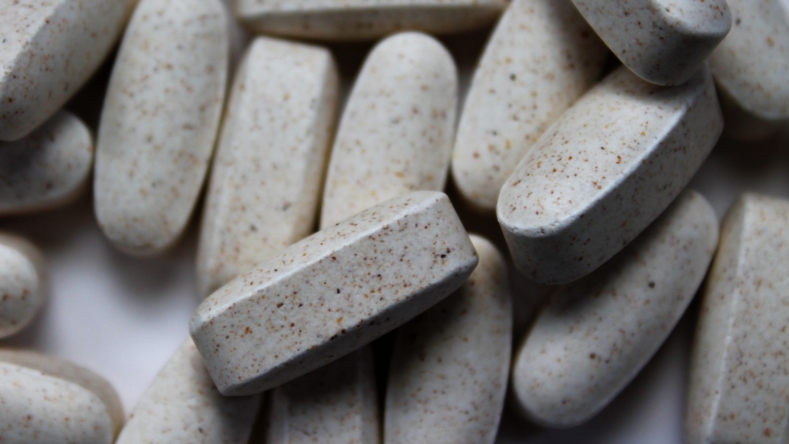What vitamins are needed daily?
This question is about Nutrition
The vitamins your body needs daily are vitamins A, C, D, E, K, and the B vitamins, which include: thiamine (B1), riboflavin (B2), niacin (B3), pantothenic acid (B5), pyridoxine B6), biotin (B7), folate (B9) and cobalamin (B12).
Your body is unable to store vitamin C, all but one of the B vitamins, and only limited amounts of K, and as a result, these vitamins should be consumed daily. These vitamins are easily obtained and absorbed from food, though a daily multivitamin can make up for any gaps in your diet. Common sources of vitamin C include citrus fruits, kiwis, berries, broccoli, and peppers. B vitamins are found in a variety of foods including whole grains, eggs, cheese, milk, beans, lentils, meat, poultry, fish, and dark leafy greens. For vitamin K, kale, collard greens, spinach, broccoli, and brussels sprouts are all great sources.
Vitamins A, B12, D, and E can be stored in significant amounts in the liver and fatty tissues. Deficiencies of these vitamins typically take longer to develop than the other vitamin deficiencies because your body has stores it can pull from on the days you fall short.
Excellent sources of vitamin A include sweet potato, squash, cooked kale, turnip greens, collards, and carrots, as well as liver, salmon, and mackerel. Meat, fish, and dairy are high in B12, as are fortified nutritional yeast, cereals, plant-based milk, and meat alternatives. Vitamin D
Below are the daily recommended amounts for each vitamin based on the Recommended Dietary Allowance (RDA) or Adequate Intake (AI) issued by the Food and Nutrition Board Institute of Medicine
Keep in mind, these recommendations are based on what the average daily intake should be to avoid deficiency-related health issues. In some cases, like Vitamin D, you may require more for optimal health.
Vitamin A
Male: 900 mcg/day
Female: 700 mcg/day
Vitamin C
Male: 90 mg/day
Female: 75 mg/day
Vitamin D
Age 1-70: 15 mcg/day (600 IU) *
Age 70 and older: 20 mcg/day (800 IU) *
Vitamin E
22.4 IU/day (15 mg/day)
Vitamin K
Male age 19+: 120 mcg/day *
Female age 19+: 90 mcg/day *
Thiamine (B1)
Male age 14+: 1.2 mg/day
Female age 18+: 1.1 mg/day (1.4 mg/day for pregnancy; 1.5 mg/day for lactation)
Riboflavin (B2)
Male age 19+: 1.3 mg/day
Female age 19+: 1.1 mg/day (1.4 mg/day for pregnancy; 1.6 mg/day for lactation)
Niacin (B3)
Male: 16 mg/day
Female: 14 mg/day
Pantothenic acid (B5)
Male age 19+: 5mg *
Female age 19+: 5mg (6 mg/day for pregnancy; 7 mg/day for lactation) *
Pyridoxine (B6)
Male age 19-50: 1.3 mg/day
Male age 51+: 1.7 mg/day
Female age 19-50: 1.3 mg/day
Female age 51 up: 1.5 mg/day
Biotin (B7)
Male age 19+: 30 mcg *
Female age 19+: 30 mcg (30 mcg/day for pregnancy; 35 mcg/day for lactation) *
Folate (B9)
400 mcg/day
Cobalamin (B12)
Males age 19+: 2.4 mcg
Females age 19+: 2.4 mcg (2.6 mcg/day for pregnancy; 2.8 mcg/day for lactation)

People also ask:
References
Office of Dietary Supplements - Biotin. (2021, March 29). Office of Dietary Supplements — NIH. Retrieved November 19, 2021, from
https://ods.od.nih.gov/factsheets/Biotin-HealthProfessional/
Office of Dietary Supplements - Pantothenic Acid. (2021, March 26). Office of Dietary Supplements — NIH. Retrieved November 19, 2021, from
https://ods.od.nih.gov/factsheets/PantothenicAcid-HealthProfessional/#h2
Office of Dietary Supplements - Riboflavin. (2021, March 26). Office of Dietary Supplements — NIH. Retrieved November 19, 2021, from
https://ods.od.nih.gov/factsheets/Riboflavin-HealthProfessional/#h2
Office of Dietary Supplements - Vitamin B12. (2021, April 6). Office of Dietary Supplements — NIH. Retrieved November 19, 2021, from
https://ods.od.nih.gov/factsheets/VitaminB12-HealthProfessional/#h2
Office of Dietary Supplements - Vitamin K. (2021, March 29). Office of Dietary Supplements — NIH. Retrieved November 19, 2021, from
https://ods.od.nih.gov/factsheets/VitaminK-HealthProfessional/#h2
Thiamine: MedlinePlus Supplements. (2020, August 19). Medline Plus, US National Library of Medicine — NIH. Retrieved November 19, 2021, from
https://medlineplus.gov/druginfo/natural/965.html
Vitamins and Minerals: How Much Should You Take? (2008, July 24). WebMD. Retrieved November 19, 2021, from
https://www.webmd.com/vitamins-and-supplements/vitamins-minerals-how-much-should-you-take
